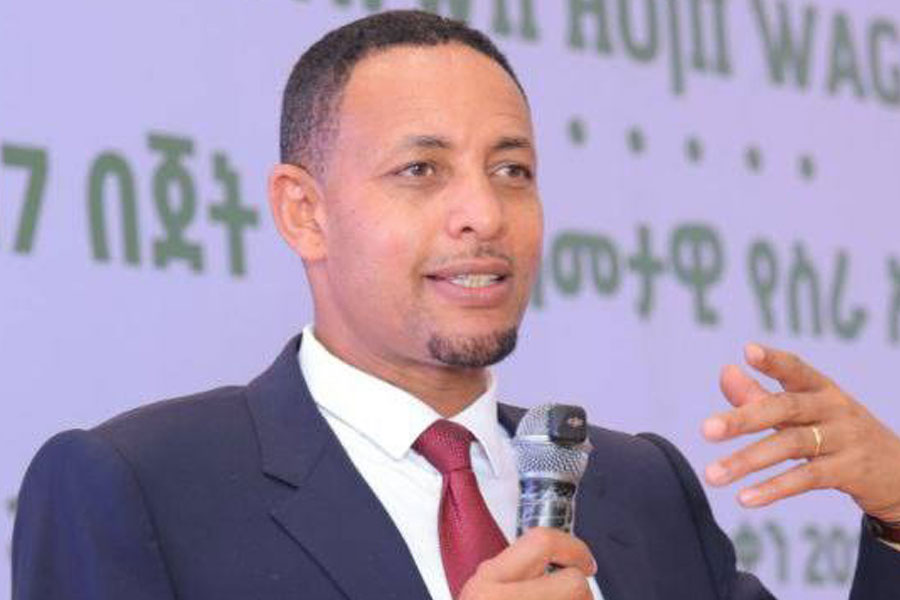
Fortune News | Aug 17,2025
May 25 , 2024
By Hintsa Andebrhan
U.S. Ambassador Ervin Jose Massinga has become a familiar name, akin to the prominence once held by Mike Hammer, Washington's Special Envoy for the Horn of Africa. The Ambassador earned this reputation after his speech two weeks ago, which focused on human rights and conveyed his government’s views on Ethiopia's ongoing political turmoil. His remarks, while diplomatically polished, were perceived by many Ethiopians as an overreach, encroaching on the country's sovereignty.
The backlash against Massinga's speech has been apparent, with many feeling their country's honour was undermined. However, an even more profound disappointment was directed at the Ethiopian government's response, which was tepid and lacked the assertiveness expected in such a situation. The government’s filing of a complaint against the U.S. Ambassador was a lacklustre gesture rather than a robust defence of national dignity.
The Ministry of Foreign Affairs, under Taye Atske-Selassie, issued a statement in response to Massinga’s speech, describing it as containing “accusations” and “unsolicited advice.” While this reaction acknowledged the contentious nature of the speech, it stopped short of the strong diplomatic measures many expected. There was no summoning of the Ambassador for a formal explanation, a move that would have signalled a firmer posturing.
Diplomats, including American ambassadors, operate under the Vienna Convention, discharging their diplomatic duties. It allows them to pursue their home country’s political and economic interests. However, this same convention also prescribes non-interference in the host country's internal affairs. Ambassador Massinga’s recent public pronouncement should have raised questions about fidelity to this principle. It is reasonable if he is perceived as crossing a red line.
Insights into the U.S. views towards Ethiopia can be gleaned from a February 2024 online briefing by the U.S. State Department, featuring Molly Phee, assistant secretary of State for African Affairs, and the Special Envoy for the Horn of Africa. It was evident that senior Ethiopian officials, including Prime Minister Abiy Ahmed, had been discussing with these high-ranking U.S. diplomats, indicating that Massinga's statements were not spontaneous. They could be part of a broader, premeditated policy direction from Washington.
Given this backdrop, the Foreign Ministry's restrained response is unsurprising. It seems that its statement, stating the historic and friendly relations between Ethiopia and the United States, was crafted to maintain diplomatic decorum rather than escalate tensions. However, it has not gone down well with the public, who feel that the country’s sovereignty was compromised without an adequate defence.
Ethiopian-U.S. relations span over a century and have historically been lopsided, often favouring American interests. The imbalance has fueled scepticism among Ethiopians about the nature of their diplomatic ties with Washington. The recent events have only amplified these sentiments, with many viewing the Ambassador’s authoritative tone as indicative of a lack of respect for Ethiopia's sovereignty. The perceived diplomatic misstep by Ambassador Massinga is further compounded by the government's perceived weaknesses in foreign policy.
Prime Minister Abiy’s administration has been criticised for its diplomatic handling - rather mishandling - which compromises the country's sovereignty. The expectation was for a more assertive and strategic foreign policy position, which is currently lacking.
It is wise to remember that the rising influence of China and Russia is also shaping Ethiopia’s geopolitical realities. These countries are increasingly seen as viable alternatives to Western powers, offering policies more aligned with the region's interests. The shifting alliances reflect a broader trend towards a multipolar world, where countries like Ethiopia seek to diversify their international partnerships.
The geopolitical shift should also remind the United States of the importance of reassessing its policies towards the Horn of Africa. The current approach, marked by perceived interference and a lack of mutual respect, risks alienating a region with over 270 million people. Restoring the trust of these countries is crucial for maintaining influence and promoting stable relations.
The diplomatic episode Ambassador Massinga created poignantly reminds us of the intricacies of international relations.
For Ethiopia, it should serve as a timely call to strengthen its foreign policy, ensuring its sovereignty and national interests are robustly upheld. The current administration's legacy will be judged by its ability to uphold national dignity in the international arena. The lessons from this episode are unambiguous. Diplomacy, assertiveness, and strategic engagement are essential for safeguarding a country's honour and security.
For the United States, it presents an opportunity to recalibrate its diplomatic strategies, recognising that respect for sovereignty and mutual interest are vital to sustaining long-term partnerships.
PUBLISHED ON
May 25,2024 [ VOL
25 , NO
1256]


Fortune News | Aug 17,2025

Fortune News | May 18,2024

In-Picture | Oct 06,2024


Fortune News | Oct 20,2024

Photo Gallery | 176952 Views | May 06,2019

Photo Gallery | 167168 Views | Apr 26,2019

Photo Gallery | 157747 Views | Oct 06,2021

My Opinion | 136938 Views | Aug 14,2021

Dec 22 , 2024 . By TIZITA SHEWAFERAW
Charged with transforming colossal state-owned enterprises into modern and competitiv...

Aug 18 , 2024 . By AKSAH ITALO
Although predictable Yonas Zerihun's job in the ride-hailing service is not immune to...

Jul 28 , 2024 . By TIZITA SHEWAFERAW
Unhabitual, perhaps too many, Samuel Gebreyohannes, 38, used to occasionally enjoy a couple of beers at breakfast. However, he recently swit...

Jul 13 , 2024 . By AKSAH ITALO
Investors who rely on tractors, trucks, and field vehicles for commuting, transporting commodities, and f...

Oct 18 , 2025
The political establishment, notably the ruling party and its top brass, has become p...

Oct 11 , 2025
Ladislas Farago, a roving Associated Press (AP) correspondent, arrived in Ethiopia in...

Oct 4 , 2025
Eyob Tekalegn (PhD) had been in the Governor's chair for only weeks when, on Septembe...

Sep 27 , 2025
Four years into an experiment with “shock therapy” in education, the national moo...

Oct 18 , 2025 . By NAHOM AYELE
In a sweeping reform that upends nearly a decade of uniform health insurance contribu...

A bill that could transform the nutritional state sits in a limbo, even as the countr...

Oct 18 , 2025 . By SURAFEL MULUGETA
A long-planned directive to curb carbon emissions from fossil-fuel-powered vehicles h...

Oct 18 , 2025 . By BEZAWIT HULUAGER
Transaction advisors working with companies that hold over a quarter of a billion Bir...